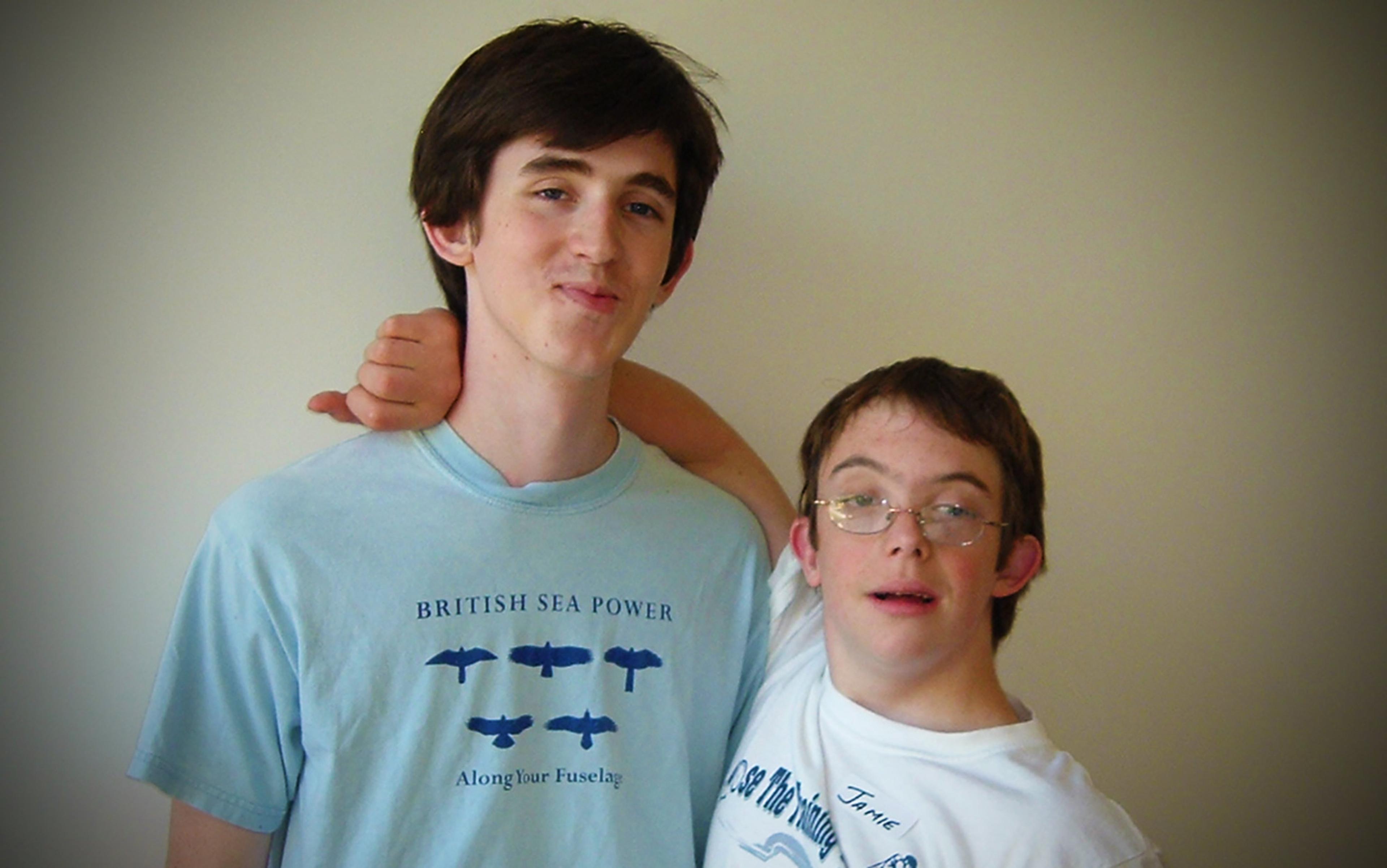When Jamie was in his tween years, not long after we moved to the town of State College in Pennsylvania from Champaign, Illinois, I was asked to serve on the board of the local chapter of The Arc – formerly known as the Association of Retarded Citizens. (Nobody misses the ‘retarded’ part, but I wish we could still say ‘citizens’: it would underscore the point that Americans with intellectual disabilities are still citizens, with legitimate claims on the body politic.)
One of my tasks as a member of the board was to review the monthly reports from the group homes. These group homes seemed to be good places, but because they housed people with intellectual disabilities – like Jamie, who has Down syndrome – alongside people with psychiatric conditions, from time to time the living conditions would become unpleasant or even unmanageable. I was advised by my fellow board members that if I wanted to consider this option for Jamie in his adult years, I should probably start the wheels rolling when he turned 14. I decided not to do that.
I did not make that decision lightly, and I did not make it alone. My wife Janet heartily agreed, and for a while we imagined that, when Jamie was no longer in school, we would hire an au pair for him. And what, I wondered, might Jamie have in mind?
One night I asked him. ‘Have you ever thought,’ I said, ‘about where you might like to live when you are a grownup and a big man?’
‘Mmm,’ Jamie said, nodding. ‘An apartment with a pool.’
‘You mean,’ I replied, knowing that the 11-year-old Jamie sometimes spoke in sentence fragments, ‘you would want a pool in your apartment?’
‘No!’ he said, sensibly. ‘In the apartment building.’
Very well then: that seemed plausible. I mean, the building sounded plausible. Jamie’s plans, not so much. At that point in his life, he really couldn’t be left alone for half an hour; he was only just beginning to learn how to use the microwave, to shower and to dress himself. Independent living seemed a very long way off.
A year or two later, I asked him again. ‘Jamie, when you grow up, do you still want to live in your own apartment?’
Jamie seemed puzzled. ‘What?’
‘You remember saying that when you are grown up, you would like to live by yourself in an apartment?’
Jamie modulated from puzzlement to alarm. He turned to me and exclaimed: ‘I don’t want to be divorced!’
I stifled a laugh, because this was serious business. ‘No, no, sweetie, a divorce is when a husband and a wife stop being married. You would not be divorced. You would just live on your own – independently.’
Wide-eyed, Jamie put a hand on my forearm. ‘I want to stay with you!’
Very well then: that seemed plausible. In fact, it seemed like the most plausible option, from every angle. (Though it dodged the question of where Jamie would live when we were no longer here, should he survive us.) So I made him a promise.
‘Jamie, you can always, always stay with us,’ I said. ‘We love you so much and you will always be our son. We will never kick you out of the house! You can always have your room and all your things. But if you ever change your mind, we can talk again, OK?’
‘I’ll stay with you,’ he repeated, adding: ‘We have no other options’ – a phrase he likes, and uses often, usually when he does not want to change his routine. So we left it there for a few more years.
With adolescence came puberty, and with high school came crushes on girls. Jamie and I have agreed – as we explain in the opening pages of Life as Jamie Knows It (2016) – that his emotional life is private, and that he and his father will not write or talk about his various crushes, then or now. Besides, the specific crushes are not the important thing. The important thing is that he had them.
‘Sometimes I wonder whether you’d like a little privacy. What if we changed the garage into a Jamie House just for you?’
So, at some point, I revisited the independent-living question. ‘Jamie,’ I said when he was either 16 going on 17 or 17 going on 18, ‘you know how you said you always want to live with us.’
‘Mmm hmm.’
‘And, like I said last time, you can always live with us. But sometimes I wonder, as you get older, whether sometimes you would like a little privacy. You know, not just your own bedroom but maybe a little place of your own, right near us. Like if we changed the garage’ – which is really a rickety storage shed, totally inadequate for a car, let alone a human – ‘into a Jamie House just for you?’
‘Michael! That is impossible!’ That is also what he said when I asked him if he ever had dreams about flying, so I assured him that although it was hard to imagine – and would certainly be prohibitively expensive – it was actually possible. Not plausible, not right now, but definitely more possible than flying.
By this point in his life, Jamie understood not only the concepts of ‘public’ and ‘private’ with regard to standards of bodily propriety and bodily display (having learned to his surprise that the distinction can rest on the few inches of space between a locker room and a hallway), but also the quotidian procedures by which one washes oneself, dresses oneself, and makes oneself breakfast by reheating pizza, naan, Szechuan beef, fish tacos or chicken tikka masala in the microwave. (Jamie will eat anything for breakfast except breakfast foods.)
Janet and I found that we could leave him to his own devices for an hour at a time, and one New Year’s Eve, when Jamie did not want to go to a local party but we did, we managed to extend that alone-in-the-house time by another 30 minutes. Leaving at 11:30, we told him we would be back by 1am; and sure enough, at 1:00:00.00 of the new year (Jamie is nothing if not literal-minded – and punctual), we got a call on our cellphones. ‘Where are you?’ he asked Janet. ‘Pulling into the driveway,’ she replied.
And did I mention that by this point in his life, Jamie had learned how to use a cellphone?
When Jamie turned 18, he became eligible for Supplemental Security Income (SSI), a programme run by the US Social Security Administration for the benefit of adults with disabilities. But he cannot accrue more than $2,000 in assets, and in 2011, he raked in $1,000 at work (recycling four hours a day – in the middle of a heat wave! – five days a week for five weeks, at $10.50 per hour) and another $500 or $600 in gift checks for his high-school graduation. So I put off the SSI application for a while. And then it took me another while longer to figure out how to get him a functional debit card. But by the time he was 19, he could buy himself whatever he wanted – usually DVDs, Magic: The Gathering cards, and lunch.
Lunch was a surprise. One day I picked him up after he had worked from 11am to 3pm, volunteering at Discovery Space, the local children’s science museum in downtown State College. ‘Should we get some lunch?’ I asked. ‘I already did,’ Jamie replied. I was nonplussed. ‘You had lunch? At Discovery Space?’
‘No, at Cozy Thai. I saw your colleagues, Jeff and Rich.’
‘You went to Cozy Thai by yourself?’ I could imagine Jamie getting himself a sandwich from Subway or Jersey Mike’s. But though Cozy Thai was only a block away from the museum, I could not, at that point, imagine him taking himself to a sit-down restaurant with waitstaff and cloth napkins.
‘And did you eat with Jeff and Rich?’
‘No, by myself.’
‘And you paid for your meal by yourself?’
‘Mmm hmm.’
‘Wow, that is so cool, Jamie.’ Jamie was clearly pleased. ‘Did you leave a tip?’
Jamie stiffened. ‘Shoot.’
Tipping is so strange. I have read more criticisms of the practice than I can count – from restaurant owners and waitstaff alike. But it is standard practice in the US, and I didn’t want Jamie to get a reputation in local restaurants as the disabled guy who doesn’t tip.
Happily, Jamie is a quick study, and he soon mastered the minor but important life skill of taking himself out to restaurants for lunch and tipping. Though I also learned, by checking his bank account online, that he sometimes managed to rack up $35 bills at India Pavilion, his favourite restaurant (three or four blocks from Discovery Space), by adding special naan orders to the standard $8.95 lunch buffet, and tipping very big.
On Wednesdays – which I began to call his Independence Days – he and I would get to the Pennsylvania State University campus (where I teach) around noon, and I would not see him again until 8pm, as he navigated his various appointments (music lessons), hangings-out at the Hub (the student centre), and travels downtown. He had long since come to terms with the fact that he cannot drive a car, and had become capable of getting himself around on municipal buses (for which he keeps a stash of tokens) and Penn State shuttles (which are free).
Even as Jamie’s independent living skills expanded to cover meals and travel, his plans for lodging remained the same: I want to stay with you
In the first chapter of Life as Jamie Knows It, I tell the story of the day in 2011 when Jamie came up to me and Janet in Central Park and asked: ‘Can I live independently?’ What he meant, as I managed to intuit, was that he wanted to take the subway by himself to visit his cousin Trevor, who lives on the Upper West Side and has a very mild disability (he can travel independently and hold down a gopher job in a law firm). Janet and I said no, on the grounds that he very possibly could take himself on the 1 train from Columbus Circle to 103rd Street, but would have no idea how to get from the 103rd Street station to Trevor’s apartment. (‘True,’ Jamie acknowledged, soberly.) But the following year, he and Trevor took themselves to a Yankee game, then out for a sushi dinner at 11pm, then got themselves to New Haven on Metro North for a family gathering the next day. He and Trevor have since taken Amtrak – and, just this year, Megabus – to visit an aunt and uncle in Boston.
Yet even as Jamie’s independent living skills expanded to cover meals and travel, his plans for lodging remained the same: I want to stay with you. For four years, from 2009 to 2013, he took part in a programme called LifeLink, in which people with intellectual disabilities shared an apartment for a week at a time, with the supervision of a 24/7 ‘life coach’. He loved LifeLink – and, after our initial trepidation, Janet and I learned to like having a week to ourselves here and there – but he aged out of it at 22. Since then, his unstructured time alone has largely consisted of YouTube and videos in his basement lair, with an occasional break for playing my drums.
In the mid-1990s, we had been introduced to the Camphill villages for adults with intellectual disabilities, but we didn’t think of them as a serious option until recently, when I learned that a friend from grade school has a brother who lives in Camphill Village Kimberton Hills, 170 miles from State College. (That friend also told me how to get Jamie a non-driver’s ID card in Pennsylvania; another friend from sixth grade now works for Social Security and helped me with Jamie’s SSI forms. Such were the surprising benefits of joining Facebook and going to the 40th reunion of my sixth-grade class.)
We visited Kimberton Hills a few years ago, but Jamie was emphatically not interested – and we noted with dismay that most of the residents were in their 40s and 50s. The cost would be about $50,000 per year, and we could visit Jamie any time, and even take him back home for as long as we wanted. The group homes near us, by contrast, are too restrictive for our use; none of us wants Jamie to live someplace where he can’t join us on our various travels, which just happen to be his favourite thing in the world (yes, his favourite thing in the world is the world). So where does that leave us?
One half-chapter of Life as Jamie Knows It tells the story of Jamie’s search for meaningful, fulfilling employment. This is, I think, the next great civil rights struggle for people with intellectual disabilities: access to the best jobs they can plausibly perform, perhaps with the support of mentors and job coaches – and financial incentives for employers. Under the Workforce Innovation and Opportunity Act (WIOA), signed into law by President Barack Obama in 2014, sheltered workshops for people with intellectual disabilities will be gradually phased out, along with their sub-minimum-wage exemption from the Fair Labor Standards Act of 1938. Jamie works in one of those workshops three days a week, earning about $1.90 an hour; he also volunteers at Discovery Space and at a local animal-rescue shelter; and he works at the Penn State University Press every Friday from 9am to 1pm, doing various cataloguing and inventory-maintenance tasks that draw on his intellectual strengths – his memory and his ability to think in lists.
But in the course of telling that story, I had to take a step back – not only to remark that, in many places around the globe, an hourly wage of $1.90 would constitute a serious raise, but also to question what we mean by ‘meaningful, fulfilling employment’. How many people are so fortunate as to have this thing in their lives? I am. Janet is. But we are not representative of all humans everywhere – or of all conscious entities, for that matter. I am thinking of the movie 2001: A Space Odyssey (1968), in which HAL tells a BBC interviewer: ‘I am putting myself to the fullest possible use, which is all, I think, that any conscious entity can ever hope to do.’ How many of us can say that? How many of us have settled instead for good-enough jobs that don’t fully engage our talents and interests, but allow us to pay the rent and entertain ourselves from time to time? And how many of us yearn for one of those merely good-enough jobs, and would be perfectly willing to leave the ‘meaningful and fulfilling’ criterion for some other aspect of our lives – a sport, a hobby, a church, or family and friends?
Your desire for a little privacy, or to decide what to eat for dinner – none of this can be dismissed as false bourgeois-liberal-individualist consciousness
In writing about Jamie’s desires for independence, I need to take another step back. This step, though, is even more uneasy. The disability rights movement in the US, from its origins in the Bay Area in the 1960s, has always been about greater autonomy for people with disabilities: access to schools, to jobs, to buildings, to public space, to political participation. And this is why laws such as the Americans with Disabilities Act of 1990 and WIOA pass Congress with such bipartisan support – yes, even WIOA, passed at a time when nothing can get through Congress with bipartisan support. Liberals and Democrats support these laws because they expand the social welfare state and bend the arc of the moral universe toward justice; conservatives and Republicans like them because they promise to help people with disabilities become less dependent on support from the social welfare state. No one seems unduly flustered by the conundrum that we all need a great deal of help in order to become more independent.
There is a similar contradiction operating in the disability community. I try to capture it in one sentence: individual autonomy is indispensable as an ideal – and totally inadequate.
The ‘indispensable’ part is easy to understand. It is woven into the fabric of US life, from the Declaration of Independence to the legends of self-made men (almost always men) to the laments about 20something college graduates living in their parents’ basements. More profoundly, it subtends our deepest hopes and fears about our bodies and minds: we want to remain in possession of our faculties, we want to make our own decisions, we want to be able to clothe and clean ourselves, we want to be able to travel freely and with minimal assistance (though, of course, with massive assistance in the forms of transportation vehicles and vast construction projects). We want to live independently.
But as the philosopher Eva Feder Kittay has been arguing for the past few decades, all the emphasis on autonomy – not just in US life but in social-contract theory since John Locke – obscures our profound interdependence as a species. That interdependence is impossible not to acknowledge at the bookends of our lifetimes, as the very young and very old are obviously dependent on caregivers for their very existence, not to mention the maintenance of their routine bodily functions. But the rest of the time – for that hopefully long stretch between the Age of Pampers and the Age of Depends – we delude ourselves into thinking that we live independently.
And yet the desire to live independently is no delusion at all. Your desire for a little privacy, your desire to decide what to eat for dinner, your desire to visit your cousin – none of this can be dismissed as so much false bourgeois-liberal-individualist consciousness. Fulfilling these desires might very well, for many of our fellow humans, make the difference between a fulfilling and an unfulfilling life.
Late this summer we received a surprise email from the founder of a local outfit called Taproot Kitchen. Taproot is a farm-to-table operation in which people with intellectual disabilities learn to garden and cook – and, from time to time, cater events in the area. Jamie has been involved with Taproot for more than a year, and has been delighted by the tasks of making pierogis, stuffed peppers and (especially) Indian food.
Taproot was founded to address the problem of what happens when young adults with intellectual disabilities suddenly find themselves isolated and underemployed. ‘We address a problem shared by many young adults with ID who, upon turning 21, leave high school and lose their major systems of support,’ the Taproot website explains. ‘Job searches are frequently unsuccessful, and even when work is found (through the laudable efforts of agencies and job coaches), it can be unfulfilling.’
Unfulfilling! Do tell. Taproot does: ‘Dishwashing, janitorial labour, and sheltered workshop piecework do not lead to the kind of flourishing that we know is possible for members of this community.’ Dishwashing, janitorial labour and sheltered workshop piecework: that pretty much sums up Jamie’s adventures with work life, except for his volunteer stints and his Friday mornings at Penn State Press. Now he also has Taproot once a week.
But this email wasn’t about food. It was about lodging: a neighbour with a rental property next door to Taproot’s headquarters (in a place called ‘the Meetinghouse on Atherton’) was willing to sell the house to… well, to whom, exactly?
Some of the Taproot families began to meet. Could we collectively afford to buy a house and pay off the mortgage by renting it to our own adult children, who would use their SSI payments for a room in the house? At least two of those adult children were ready, willing and (we hope) able to live in such a place permanently, with some supervision, and some were willing to give it a try for a month at a time. Jamie was reluctant at first, until I reminded him that right now, all he had was his basement lair.
He might quickly discover how pleasant it can be to live with one’s friends, away from one’s parents, for an entire month
‘Michael!’ he objected. ‘We have no other options.’
‘Jamie,’ I replied, ‘this is another option. That’s exactly what it is. Now you might have another option – living four blocks away from us for a month now and then.’
A month seems too long to him, since he has known only week-long LifeLink respites from living with his parents. We suspect, however, that if this Taproot House becomes a real thing, he will quickly discover how pleasant it can be to live with one’s friends, away from one’s parents, for an entire month.
It is a daunting enterprise: four families have to form a limited liability corporation. We have to secure a mortgage at a rate we can afford. We have to spruce up the place (right now, it is a student rental, with all that implies) and work out a schedule of who lives where and when. And then we have to find out if our kids-who-are-no-longer-kids can actually live together, living independently.
We did not see this coming. But I take heart in the fact that the Arc itself started, in 1950, as a grassroots parents’ group – people coming together to try to address (and redress) the lack of social supports for people with intellectual disabilities. If this Taproot House works, it could serve as an alternative model to group homes and villages such as Camphill.
We have a lot of work to do to make that happen – Jamie, his friends, and all their parents. But for now, at least, we know one thing: we no longer have no other options.






